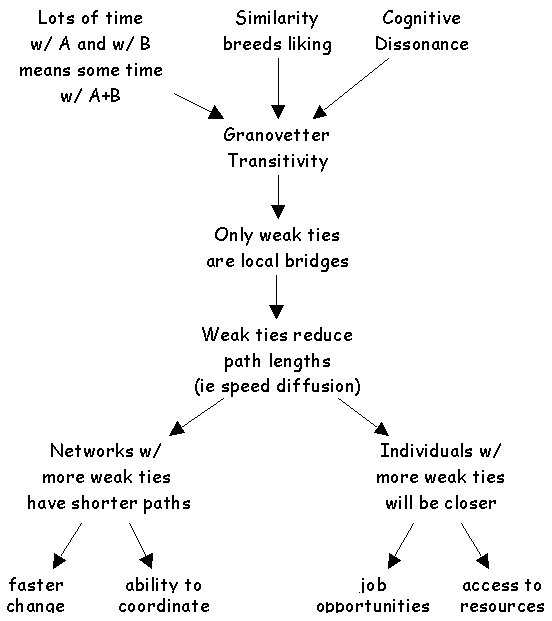고래가 부르는 노래
Granovetter"s Theory of the Strength of Weak Ties 본문
Granovetter"s Theory of the Strength of Weak Ties
Motivation for Granovetter’s Theory
- Careers, job changing. Why is it that people so often get jobs from weak ties?
- How do large groups coordinate to make things happen, for example to meet a threat from outside
- Since then it has developed into a larger perspective known as embeddedness, which holds that all economic action, including that by organizations, is enabled and constrained and shaped by social ties among individuals
출처 : http://www.analytictech.com/networks/weakties.htm
Overview of the Theory

Implications
- Individuals with more weak ties have greater opportunities for mobility
- Coser’s theory of autonomy (built on Simmel): lots of weak ties provide "seedbed of individual autonomy". People with many weak ties [Toennies’ Gesellschaft] live up to the expectations of several others in different places and at different times, which makes it possible to preserve an inner core — to withhold inner attitudes while conforming to various expectations. People with strong ties [Gemeinschaft] share norms so thoroughly that little effort is needed to gauge intentions of others
- Relates difference to Basil Bernstein’s distinction between restricted and elaborated codes of communication. Elaborated are complex and universal. More reflection is needed in organizing ones communication to very different people. [weak ties]
- In elaborated speech there is high level of individualism, as it results from the ability to put oneself in imagination in the position of each role partner.
- Social structure of poor is strong tie based, which does not encourage complex role set that in turn develops intellectual flexibility and self-direction.
- Weak ties --> complex role sets --> cognitive flexibility --> ability of communities to organize. Complex voluntary orgs may depend on a habit of mind permits one to assess the needs, motives actions of a variety of people simultaneously.
- Adoption of innovation: made difficult by strong ties
- Mobilizing for change in response to environmental jolts:
- Italian community of the west end in boston in 1962 were unable to fight "urban renewal" process which destroyed it. Gans attributes to working class culture (but other working class neighborhoods have succeeded).
- Divided into kinship and lifelong friendship cliques that were relatively closed. Unable to connect across cliques. People’s work was outside the community, so no sources of informal ties.
- More weak ties, more capable of acting in concert. Strong ties breed local cohesion and macro fragmentation
'고래노래의 사는 이야기 > 웹 기획 이야기' 카테고리의 다른 글
| [07.07.25] SOA (0) | 2007.07.25 |
|---|---|
| 브라우저 익스텐션 (0) | 2007.07.25 |
| 블로그 이용성향 - 코리안 클릭 자료 (0) | 2007.06.26 |
| [Summary] 롱테일의 법칙 (0) | 2007.06.22 |
| 블로그 doll~ (0) | 2007.06.04 |
